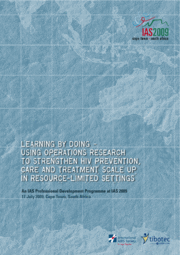IAS/OR/Cape Town Programme
Contents
Overview
Learning by Doing - Using Operations Research to strengthen HIV prevention, care and treatment scale up in resource-limited settings
An engaging week long Operations Research Programme for HIV researchers and programme managers; organized by the International AIDS Society; with mentoring at the IAS 2009 conference.
Partners and prospective partners
Prospective partners: The Lung Union
Dates and location
Dates:
- 17 July 2009 - Workshop
- 18 July - Writing workshop and outreach tour
- 19-22 July - IAS 2009 Conference
Location: Cape Town
Concept
Goal
The goal of this programme is to facilitate the continuing professional development of researchers interested in conducting operations research on HIV/AIDS service delivery programmes.
Rationale
The HIV pandemic remains the most serious infectious disease challenge to public health, especially in sub-Saharan Africa where AIDS is still the leading cause of death. There is growing international recognition that greater investment in comprehensive research is needed to expand our knowledge and understanding of the operations of HIV programmes, in the context of the rapid scale-up of HIV prevention, treatment and care in resource-limited countries within a public-health approach. The Sydney Declaration (2007), the Consensus Statement (2008) and the recent Vancouver 2nd Global Experts Summit (February 2009) bear witness to the International AIDS Society’s (IAS) advocacy of this policy priority.
While global health initiatives and international public-private partnerships have made considerable progress towards advancing the capacity of the health workforce in delivering treatment, care and support, they face considerable challenges in developing effective and sustainable models for applied clinical learning and training support. In addition, sustainable improvements in programme operations now require that health care worker’s reflective capacities, and their critical awareness to monitor and analyse their work practices in relation to the quality of care they are delivering, are continuously developed so as to make a difference to people living with HIV and, concurrently, strengthen health systems.
Objectives
- To discuss the basic concepts and different definitions of operations research currently adopted
- To discuss and understand different logistical and operational barriers encountered over the last decade in implementing scale-up HIV programmes
- To understand the major analytical methods
- To discuss existing operations research based models/solutions /interventions
- To equip participants with the means to carry out operations research on service delivery programmes
Long term outcomes (3-5 years)
- Widespread access in the region to effective learning programmes about OR via local training institutes and regional partners
- Strong, dynamic regional professional networks and mentoring relationships linking program managers with health and education providers dealing with OR on HIV/AIDS programmes
- Publication of research from the field through abstracts at AIDS and health Conferences, by building scientific writing capabilities
Short term outputs
- Increased quantity and quality of OR on HIV/AIDS programmes
- Experiences of improving HIV/AIDS programming shared among participants and other stakeholders to build the evidence base
- Proof of concept of 3-Os learning model developed
- A range of enabling materials are available to facilitators to help in developing programmes in country
- Concrete plans to develop educational programmes about OR on HIV/AIDS in 5 regions
- Concrete linkages formed between programme managers and OR experts to facilitate in-service online mentoring
- Participants have increased skills in research, and abilities to train others and facilitate research and learning processes upon return to the workplace
- The emergence of an OR community of practice to sustain and engage participants after the workshop
Approach
- Build from existing OR framework
- Bring together subject specialists with programmers through selection process
- An inclusive, engaging, highly participatory workshop focused on sharing experience, practical group work, skills training
- Pre-workshop discussions with participants in an online forum; pre-workshop online wiki skills training
- Site visit to a HIV programm in Cape Town, e.g. Khayelitsha
Participation
- Regional Balance with priority for Africa
- Gender Balance (15 female, 10 male)
- Balance of research topics (ART scale-up, TB-HIV, Paediatric, Stigma)
- 25 HIV AIDS Programme Managers, clinicians and researchers especially from "resource-constrained" settings, ideally in middle management, with the potential to instill a culture of research by practitioners upon returning to their workplace
- Guest speakers
- 3 lead trainers/facilitators
Background Reading
Operational research in low-income countries: what, why, and how?
